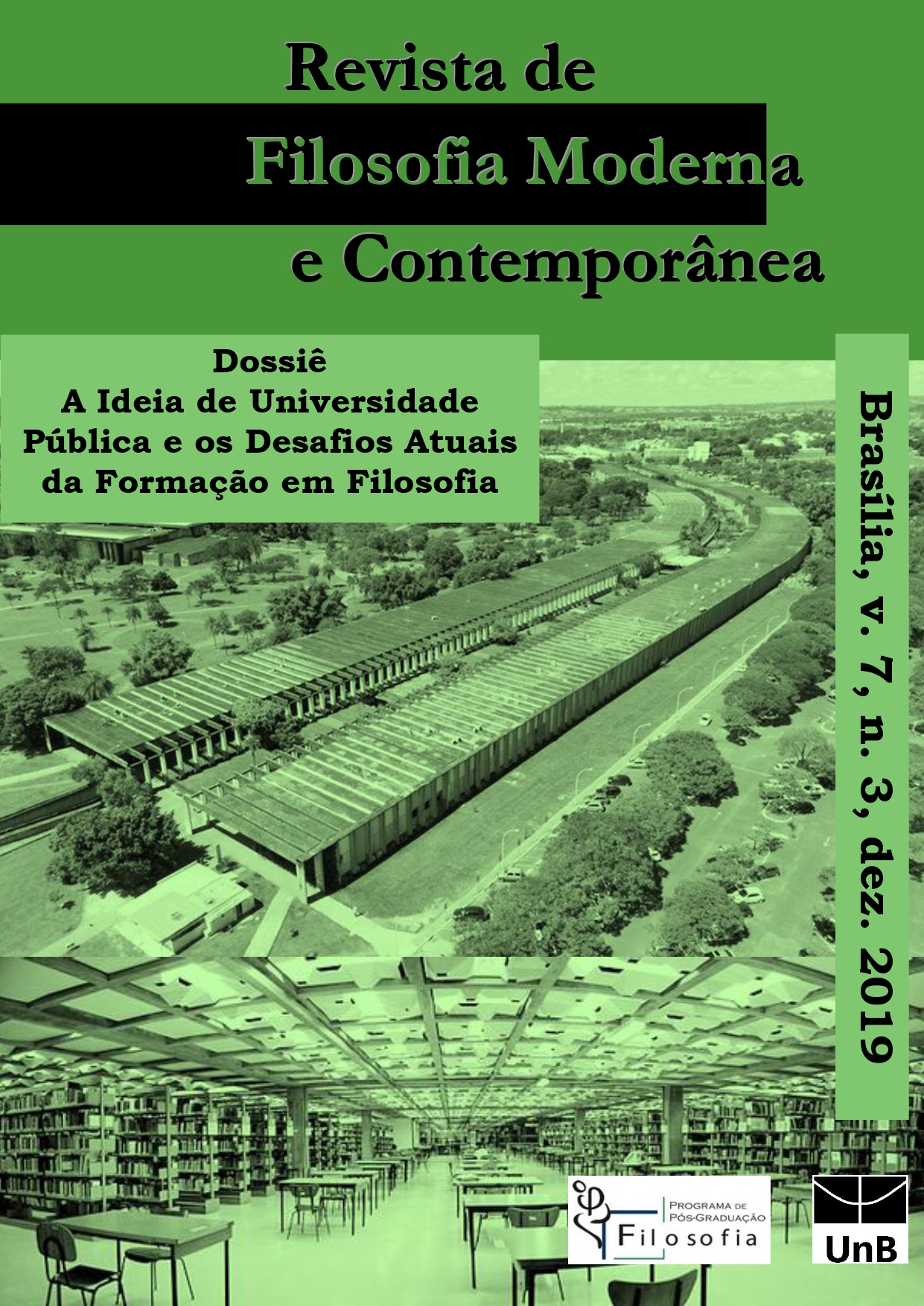Methodology of Adaptationist Explanations
DOI:
https://doi.org/10.26512/rfmc.v7i3.27509Keywords:
adaptationism; evolution; natural selection; scientific explanation; cognitive valuesAbstract
This paper theme is linked to the discussion concerning the explanatory power of the adaptationist program, which is mainly based on the process of natural selection. The themes presented and discussed here will be methodologically outlined to present, at the end, the theoretical framework from which the adaptationism may have been located within a broad discussion on evolution. However, the thesis that adaptationist explanations are the most effective and trusted ones among other existing alternatives and that should be, therefore, the most used in the scientific circles will not be supported here. In contrast, this paper will try to show that adaptationist explanations have their cognitive values broadened when linked to approaches which are based on evolutionary mechanisms other than natural selection, as well as well-established knowledge. Its heuristic power is expanded and will allow us to really understand and analyze many of the problems of evolution together with the formulation of the right questions concerning the biological phenomena.
Downloads
References
ABRANTES, P. & ALMEIDA, F. Evolução Humana: A Teoria da Dupla Herança. Em: ABRANTES, P. [et al.]. Filosofia da Biologia. Porto Alegre: Artmed, 2011, pp. 261-295.
BRANDON, R. Adaptation and Environment. New Jersey: Princeton University Press, 1995.
CAPONI. G. Aproximação Epistemológica à Biologia Evolutiva do Desenvolvimento. Em: ABRANTES, P. Filosofia da Biologia. Porto Alegre: Artmed, 2011a, pp. 211-223.
_____ La Segunda Agenda Darwiniana: contribución preliminar a la historia del programa adaptacionista. México, DF: Centro de Estudios Filosóficos, Políticos y Sociales Vicente Lombardo Toledano, 2011b.
COPI, I. Introdução à Lógica. São Paulo: Mestre Jou, 1978.
CRONIN, H. Adaptation: a critique of some current evolutionary thought. Em: The Quarterly Review of Biology. London: Centre for Philosophy of Natural and Social Science, 80 (1), 2005, pp. 19-26.
DARWIN, C. On the Origin of Species. London: Penguin Books, 2009.
DAWKINS, R. The Extended Phenotype: the long reach of the gene. New York: Oxford University Press, 1999.
_____ O Gene Egoísta. São Paulo: Companhia das Letras, 2007.
FEYERABEND, P. Contra o Método. São Paulo: Editora UNESP, 2007.
GODFREY-SMITH, P. Darwinian Populations and Natural Selection. New York: Oxford University Press, 2009a.
_____ What Darwinism Explains. Cambridge: University of Cambridge, for the Darwin Festival, july 2009b. Disponível em: < https://www.researchgate.net/publication/265880015_What_Darwinism_Explains>. Acesso em: 10 mar. 2011.
GOULD, S. J. & LEWONTIN, R. C. The Spandrels of San Marco and the Panglossian Paradigm: a critique of the adaptationist programme. Londres: Proc. R. Soc. B 205, 1979, pp. 581-598.
GOULD, S. J. & VRBA, E. Exaptation - a missing term in the science of form. Boulder: Paleobiology, vol. 8, no 1, 1982, pp. 4-15.
GRÜNE-YANOFF, T. Appraising models nonrepresentationally. Chicago: The University of Chicago Press, 2013. Disponível em: <https://www.jstor.org/stable/10.1086/673893?seq=1#page_scan_tab_contents>. Acesso em: 30 de mai.2018.
HEMPEL C. G. & OPPENHEIM P. Studies in the Logic of Explanation. Philosophy of Science, 1948. Diponível em: < http://citeseerx.ist.psu.edu/viewdoc/summary?doi=10.1.1.294.3693>. Acesso em: 6 de jun. 2018.
HUME, D. Investigação Acerca do Entendimento Humano. Nova Cultural, Os Pensadores, São Paulo, 1999.
JABLONKA, E. e LAMB, M. J. Evolução em Quatro Dimensões. São Paulo: Companhia das Letras, 2010.
LALAND, K. N. & BROWN, G. R. Sense and Nonsense: Evolutionary Perspectives on Human Behaviour. New York: Oxford University Press, 2002.
LORENZANO, P. Leis e Teorias em Biologia. Em: ABRANTES, P. Filosofia da Biologia. Porto Alegre: Artmed, 2011, pp. 53-82.
MAYR, E. O Desenvolvimento do Pensamento Biológico. Brasília: UnB, 1998.
_____ Biologia, Ciência Única. São Paulo: Companhia das Letras, 2005.
_____ Isto é Biologia: A Ciência do Mundo Vivo. São Paulo: Companhia das Letras, 2008.
POPPER, K. A Demarcação Entre Ciência e Metafísica. Em: CARRILHO, M. Epistemologia: Posições e Críticas. Lisboa: Calouste Gulbenkian, 1991, pp. 201-265.
PSILLOS, S. Causation & Explanation. Montreal & Kingston: McGill-Queen’s University Press, 2002.
REZNICK, D. N. & GHALAMBOR, C. K. The population ecology of contemporary adaptations: what empirical studies reveal about the conditions that promote adaptive evolution. Riverside: University of California, 2001. Disponível em: <https://biology.ucr.edu/ucirpee/ReznickGhalambor2001.pdf>. Acesso em: 6 de jun. 2018.
ROSENBERG, A. The Structure of Biological Science. New York: Cambridge University Press, 1985.
_____ Introdução à Filosofia da Ciência. São Paulo: Loyola, 2009.
SANTILLI, E. Níveis e unidades de seleção: o pluralismo e seus desafios filosóficos. Em: ABRANTES, P. Filosofia da Biologia. Porto Alegre: Artmed, 2011, pp. 193-210.
STERELNY, K & GRIFFITHS, P. E. Sex and death: an introduction to philosophy of biology. Chicago: The University of Chicago Press, 1999.
SEPÚLVEDA, C. & MEYER D. & EL-HANI, C. Adaptacionismo. Em: ABRANTES, P. Filosofia da Biologia. Porto Alegre: Artmed, 2011, pp. 162-192.
SOBER, E. Philosophy of Biology. 2nd edition, Boulder: Westview Press, 2000.
Downloads
Published
How to Cite
Issue
Section
License
Copyright for articles published in this journal is retained by the authors, with first publication rights granted to the journal. By virtue of their appearance in this open access journal, articles are free to use, with proper attribution, in educational and other non-commercial settings.


